Since triggered abilities are not represented in the game physically, and events that set them off are numerous, so it is quite natural that players occasionally miss them.
The following cases are quite frequent, are they not:
- You forgot to “feed” the Masticore;
- You failed to remove a counter off a suspended card;
- You forgot to put a token for Bitterblossom;
- You missed gaining life when a creature entered play with Essence Warden out;
- You drew a card without revealing it for Dark Confidant;
- You attacked and skipped Exalted;
- You failed to transform a double-faced card;
- And YIKES! you forgot to pay for a Pact.
As in many other cases, missed triggers are treated differently at regular and competitive REL events. First, let me mention what a judge needs to do in a Regular REL event::
Issue:
A player forgets a triggered ability (one that uses the words “when,” “whenever,” or “at the beginning”, usually at the start of the ability's text)
Remedy:
These abilities are considered missed if the player did not acknowledge the ability in any way at the point that it required choices or had a visible in-game effect.
If the ability includes the word “may,” assume the player chose not to perform it. Otherwise, put the ability on the stack unless you think it would be too disruptive — don’t add it to the stack if significant decisions have been made based on the effect not happening!
Unlike other illegal actions (which must be pointed out), players may choose whether or not to point out their opponent's missed triggers.
When making a ruling at a Regular REL event, don't forget to mention that at Competitive REL, the judge's ruling may be different (this is enough if you do not know the IPG well enough) and explain how it will be different in that case. You can learn it by reading this article entirely.
Recommendations for Regular REL are written vaguely so that you are able to act depending on the situation.
In tournaments with Competitive REL it is a little more complex. In order to understand the rulings and recommendations, let us take a look at the rules, this time, the Infraction Procedure Guide (IPG):
A triggered ability triggers, but the player controlling the ability doesn’t demonstrate awareness of the trigger’s existence by the first time that it would affect the game in a visible fashion
This means that the player must demonstrate in due time the fact that he or she remembers the trigger. When is this “due time”? The rules come up with the following answer:
The point by which the player needs to demonstrate this awareness depends on the impact that the trigger would have on the game:
A triggered ability that requires its controller to choose targets (other than 'target opponent'), modes, or other choices made when the ability is put onto the stack: The controller must announce those choices before they next pass priority.
The part about targets is obvious: failed to announce target(s) = missed trigger. Since there is just one opponent in a duel, he or she is chosen by default.
An attentive reader would ask about 2HG. I have inquired :). The official's answer was as follows: “If we run 2HG at Competitive, we will have to rewrite a lot in the IPG”. Based on my own experience, I would compile a few rules to issue the following ruling: the main head (the player with no players to his or her right) was chosen as the target. This ruling isn't perfect, but it's as good as I can make it.
A triggered ability that causes a change in the visible game state (including life totals) or requires a choice upon resolution: The controller must take the appropriate physical action or acknowledge the specific trigger before taking any game actions (such as casting a sorcery spell or explicitly taking an action in the next step or phase) that can be taken only after the triggered ability should have resolved. Note that passing priority, casting an instant spell or activating an ability doesn’t mean a triggered ability has been forgotten, as it could still be on the stack.
- The change in life totals needs to be marked and the token must be put for Bitterblossom before drawing a card.
- A creature enchanted by Claustrophobia must be tapped before the next creature or sorcery spell is played.
- If you cast Thundermaw Hellkite and decide to attack with it, you need to mark damage and have creatures tapped before moving towards the combat phase.
A triggered ability that changes the rules of the game: The controller must acknowledge the trigger or stop an opponent who tries to take any resulting illegal action.
A player attacks with Pyreheart Wolf. He is considered to remember his trigger until the point where he agrees to an illegal (from the point of view of the trigger's effect) block.
You cast Emrakul, but say nothing about the extra turn. The cunning opponent asks: “May I untap?”, you affirm. The trigger is missed.
If a player controlling the trigger demonstrates awareness of the trigger, and then makes a mistake (like resolving the trigger wrongly), we deal with another type of error that is treated differently.
Once any of the above obligations has been fulfilled, further problems are treated as a Game Play Error — Game Rule Violation.
The cunning opponent attacks with a creature equipped with Sword of Feast and Famine. The damage is dealt, he untaps the lands but forgets to have us discard. During our turn, the opponent wonders about the number of cards in our hand and remembers that the card wasn't discarded. This case is not Missed Trigger, it is a Game Rule Violation (GPE - GRV).
Back to missed triggers. Let me point out an important fact: we treat only unintentional errors as such.
Players are expected to remember their own triggered abilities; intentionally ignoring one may be Unsporting Conduct — Cheating (unless the ability would have no impact on the game as described above).
I.e., each player is held responsible only for their own triggers. This rule is applied at Regular REL events as well. It is now mentioned not only in IPG, but in Tournament rules, too.
If it is your trigger, you are responsible for it. If you "forget" (I mean, intentionally miss a trigger), it is cheating. With one exception: if a trigger you intentionally miss does nothing, it is no violation to miss it:
If a triggered ability would have no impact on the game, it’s not an infraction to fail to demonstrate awareness of it. For example, if the effect of a triggered ability instructs its controller to sacrifice a creature, a player who controls no creatures isn’t required to demonstrate awareness of the ability. Similarly, a player demonstrating awareness of an optional trigger with no visible effect is assumed to have made the affirmative choice unless the opponent responds.
For instance, if an attacking Chasm Drake is the only attacker, you may ignore its trigger.
Triggered abilities that do nothing except create delayed triggered abilities automatically resolve without requiring acknowledgment. Awareness of the resulting delayed trigger must be demonstrated at the appropriate point.
Examples: Loyal Cathar, Grave Betrayal.
Triggered abilities that do nothing except create one or more copies of a spell or ability (such as storm or cipher) automatically resolve, but awareness of 8 the resulting objects must be demonstrated using the same requirements as described above (even though the objects may not be triggered abilities).
Examples: Dragonstorm, Stolen Identity.
Let us look at the examples of missed triggers given in the rules:
- Knight of Infamy attacks alone. Its controller says "Take two."
- A player forgets to remove the final time counter from a suspended spell and then draws a card during his draw step.
- A player casts Manic Vandal, then forgets its triggered ability by not choosing a target for it. They realize this only after casting another spell.
- A player forgets to exile the Angel token created by Geist of Saint Traft at end of combat. They realize the error when declaring blockers during the next turn.
Alright, so, the player in control of a trigger misses it. What happens then?
If the triggered ability is usually considered detrimental for the controlling player and they own the card responsible for the existence of the trigger, the penalty is a Warning.
“Usually considered detrimental” is quite a vague definition.
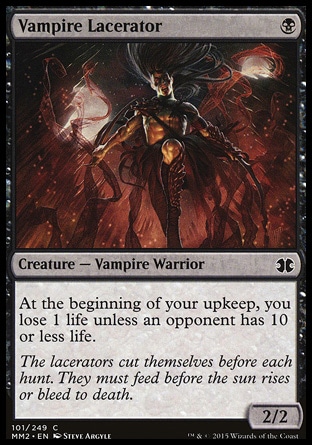
The trigger of Vampire Lacerator is obviously “usually detrimental”, it's a drawback for the 2/2 creature for one mana.
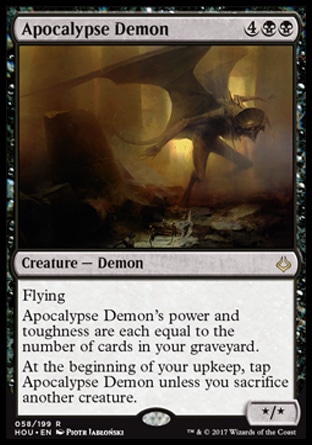
The trigger of Apocalypse Demon if “usually detrimental” too. Any of the actions is unpleasant: you either tap the demon or sacrifice the creature.
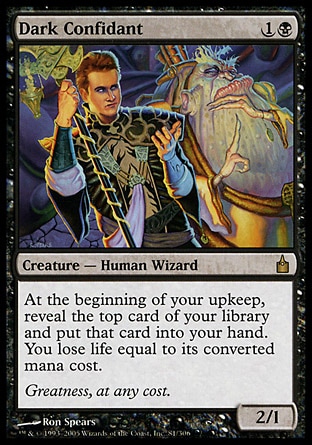
The trigger of Dark Confidant, on the other hand, is obviously not detrimental, it's pretty much the reason for playing this card.
Naturally, if its controller is low on life it's rather detrimental for him, but we do not evaulate the game state to determine this.
The player will not get a Warning for a missed trigger of a Confidant (unless he decides to "forget" it intentionally which will end very unpleasantly for him.
It is possible that different judges vary their rulings in each specific situation. The recommendations to take to account when attending a missed trigger situation are as follows:
The current game state is not a factor in determining this, though symmetrical abilities (such as Howling Mine) may be considered usually detrimental or not depending on who is being affected.
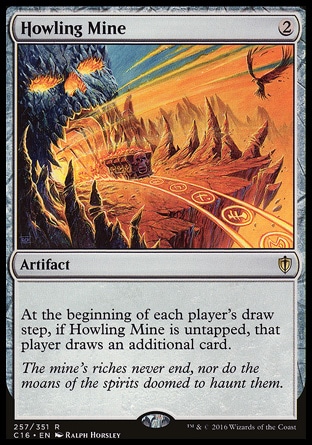
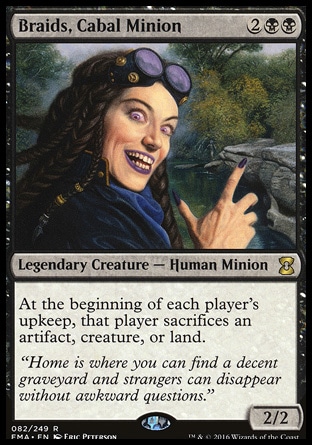
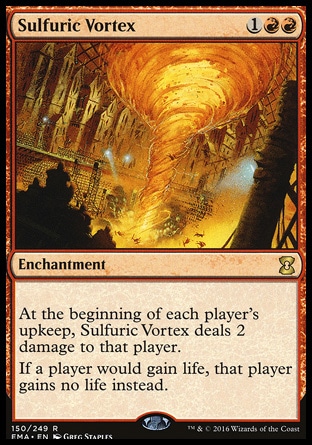
Now's the time for an important question: what do we undertake towards the forgetful opponent? There are two players at the table, and other than the trigger's controller, the fact of missing a trigger is usually clearly visible to the other player.
Opponents are not required to point out triggered abilities that they do not control, though they may do so if they wish.
That's good news: we are not obliged to think instead of our opponent and to remind him of his triggers.
We will not be punished for the case where an opponent misses a trigger (note that in all other game play errors, both players are responsible for the game state!).
Even if an opponent is involved in the announcement or resolution of the ability, the controller is still responsible for ensuring the opponents make the appropriate choices and take the appropriate actions.
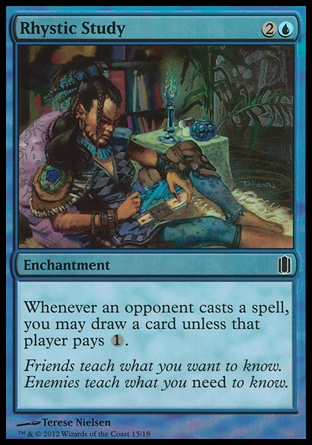
When resolving Rhystic Study's trigger, we'll have to ask our opponent whether or not he wants to pay mana. If he refuses, we may draw a card.
Same with Frost Titan: we must ask our opponent whether or not he wishes to pay {2}.
Not reminding an opponent about their triggered abilities is never Failure to Maintain Game State nor Cheating.
We are fully authorized to observe our opponent play silly, but we may not act in a way to prevent him from managing his triggers, or become aware of their existence. Magic is not a contest of speed and reaction!
Players may not cause triggered abilities controlled by an opponent to be missed by taking game actions or otherwise prematurely advancing the game. During an opponent’s turn, if a trigger’s controller demonstrates awareness of the trigger before they take an active role (such as taking an action or explicitly passing priority), the trigger is remembered.
Examples: Verdant Force, Form of the Dragon
If our opponent plays wrong technically, but the sequence of his actions leads to a legit game state, he will not be punished (to our greatest regret):
The Out-of-Order Sequencing rules (MTR section 4.3) may also be applicable, especially as they relate to batches of actions or resolving items on the stack in an improper order.
Sometimes we will need to remind our opponent of his trigger. For instance, if you wish to specify the stats of a creature with Exalted:
Triggered abilities are assumed to be remembered until otherwise indicated, and the impact on the game state may not be immediately apparent. The opponent’s benefit is in not having to point out triggered abilities, although this does not mean that they can cause triggers to be missed.
If an opponent requires information about the precise timing of a triggered ability or needs details about a game object that may be affected by a resolved triggered ability, that player may need to acknowledge that ability’s existence before its controller does.
A player who makes a play that may or may not be legal depending on whether an opponent’s uncommunicated trigger has been remembered has not committed an infraction; their play either succeeds, confirming that the trigger has been missed, or is rewound.
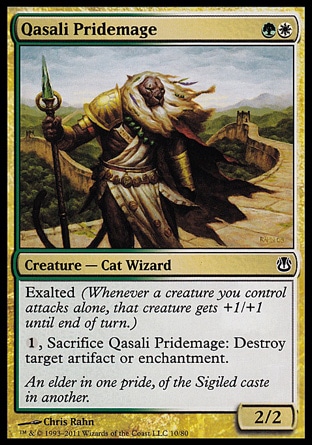
This means that if an opponent attacks with his lone Qasali Pridemage, we suppose that it is 3/3 through Exalted all the way until the opponent says "take two". At this point we receive confirmation that the opponent missed his trigger. And now it is up to us whether to resolve it or not.
If an opponent resolves a Primeval Titan, and then casts a sorcery or declares attackers, it demonstrates that he missed the trigger of the Titan and will no longer be able to find the lands.
When a judge observes a game and notices an error therein, he is supposed to interfere with the game. Right? WRONG!
Judges do not intervene in a missed trigger situation unless they intend to issue a Warning or have reason to suspect that the controller is intentionally missing their triggered abilities.
Here we are at fixing the error. Some errors are fixed without the players' participation:
If the triggered ability is an enters-the-battlefield trigger of an Aura that affects only the enchanted permanent and causes a visible change to that permanent, resolve the ability immediately.
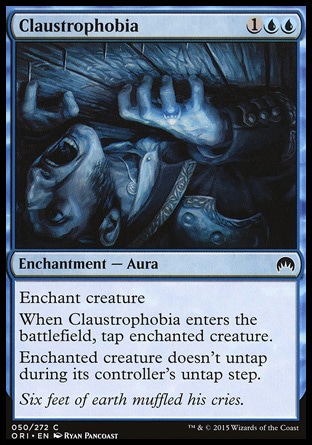
The player enchanted the opponent's creature with Claustrophobia and forgot to tap it. As soon as this is detected, the creature will be tapped.
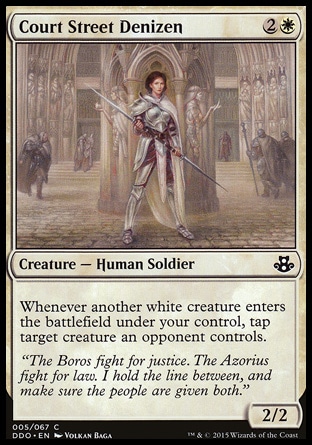
This rule is not applyed the trigger of Court Street Denizen, because this card is not an aura.
If the triggered ability is a delayed triggered ability that undoes a zone change (including token creation) caused by the effect that created the delayed triggered ability, the opponent chooses whether to resolve the ability the next time a player would get priority or when a player would get priority at the start of the next phase. The new zone does not need to be the same as the one the card was originally moved from.
Examples: Grave Betrayal, Obzedat, Ghost Council, Whip of Erebos
If it is determined that the Angel token from Geist of Saint Traft wasn't exiled, your opponent will decide whether to exile it immediately or at the beginning of the next phase.
If you target Loyal Cathar with your Animate Dead, you may choose to gain control of it before the Cathar's trigger (which was obviously missed) resolves.
For all other triggered abilities, if the ability was missed prior to the current phase in the previous turn, instruct the players to continue playing. If the triggered ability created an effect whose duration has already expired, instruct the players to continue playing.
And finally, there is a series of missed triggers, the existence of which relies entirely on the opponent's choice:
If the triggered ability isn’t covered by the previous paragraphs, the opponent chooses whether the triggered ability is added to the stack. If it is, it’s inserted at the appropriate place on the stack if possible or on the bottom of the stack. No player may make choices for the triggered ability involving objects that would not have been legal choices when the ability should have triggered. For example, if the ability instructs a player to sacrifice a creature, that player can't sacrifice a creature that wasn't on the battlefield when the ability should have triggered.
If your opponent forgets his trigger, you do not have to remind him about it. But if you wish to get this trigger to resolve, you are supposed to call for a judge. If you forget your trigger by accident, you won't be able to resolve it against your opponent's wish. And by the way, don't forget to call a judge!
A missed trigger is one of the Game Play Errors. Multiple infractions related to the same category lead to upgrading the penalty:
With the exception of Failure to Maintain Game State, which is never upgraded, the third or subsequent Warning for a Game Play Error offense in the same category is upgraded to a Game Loss.
For multi-day tournaments, the penalty count for these infractions resets between days.
This way, the third warning for a missed trigger turns into a GL. Do not forget to notify players about this to instigate their attention to the game state.
Playing with Sorin Markov, Mindslaver, Emrakul, the Promised End or Worst Fears keep in mind:
A player controlling another player is responsible for that player’s triggers in addition to their own.

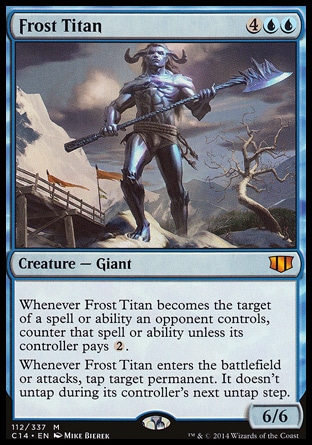
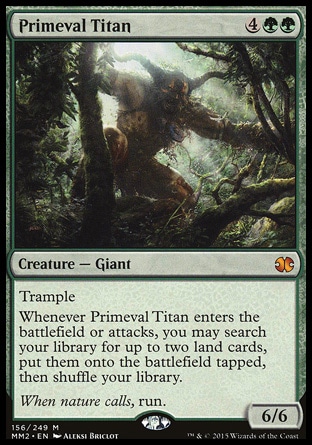
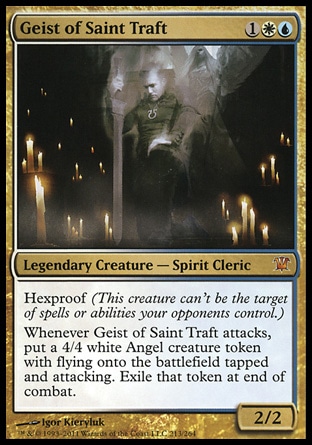
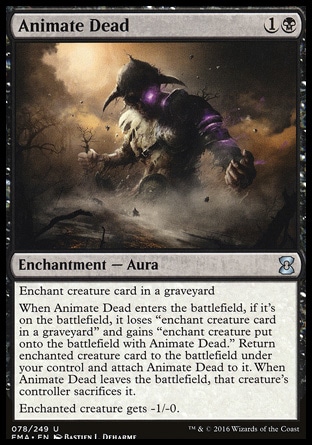
In what concerns Howling Mine, Braids, Cabal Minion or Sulfuric Vortex, these cards have triggers that do something in both our turn and our opponent's turn (note that in both cases the permanent's controller controls the trigger). Obviously, it depends of whose turn it is when determining whether it is detrimental or not. This will be the factor to evaluate the missed trigger.